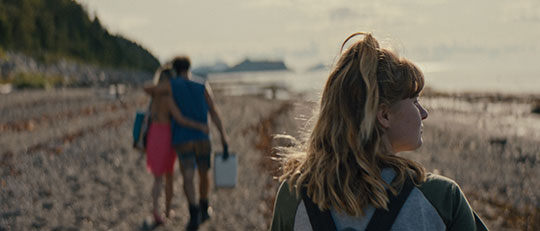Seeing the car of her mother’s ex parked in the driveway takes Chloé back to the summer all three of them spent by the river, when “everything started and ended at the same time”. Writer/director Ariane Louis-Seize further refines her cinematic preoccupations in Comme une comète (Shooting Star), a short film that, like her previous two short films Les Petites vagues and Les Profondeurs, blends complicated family drama with female coming-of-age themes. By continually honing her voice in this subject space it is arguable that Louis-Seize’ filmmaking has never been sharper.
Having always been a receptive audience for stories of complex mother/daughter relationships, I was very much looking forward to learning where Louis-Seize drew her inspiration when penning the characters and the narrative. She shared with us that seeing firsthand some of those relationships as a teen triggered this reflection that has stayed with her since, remarking to us that, “It left me with a lot of thinking about family ties and unconditional love regardless of our flaws, weaknesses, mistakes, or however strong our desires for emancipation are.”
From that starting point, Louis-Seize built a whole universe that she brings to the screen immersively. With its twenty-minute runtime, the film isn’t a short short but it is the kind of film you’d happily spend more time in. The mother/daughter relationship is centered, but Chloé’s perspective is privileged, as the film utilizes her as a narrator. I am usually not a fan of narration in films but here, I found that Louis-Seize uses it thoughtfully—establishing subtle key elements without treating it as a crutch to spell out the nuances and depth of the film.
Louis-Seize uses the length to spend time with the characters and ease the audience into their general dynamic before shaking things up. While the mother is the archetype of a party girl, boisterous and extroverted, the Chloé character is layered, which makes her coming-of-age experience all the more fascinating. All three characters have a realistic feel to them, they are flawed human beings and Louis-Seize made sure to capture a complex situation, testing her characters, mostly Chloé, without ever having a judgemental look at them: “I like unconventional characters who’re testing their own limits and the limits of others”.
The chemistry between Marguerite Bouchard, Chloé and Patrick Hivon is quite impressive. Going from the cool stepfather to the person who would have to be the responsible adult figure in this complex dynamic, Hivon’s reaction to witnessing Chloé growing up is remarkably compelling. While it all starts with a long conversation between the two, their dynamic evolves for the rest of the film with exchanged looks that are more powerful than a dialogue would have been. Bouchard peels the layers of her character beautifully, revealing what’s actually brewing inside of her with authenticity and sensitivity allowing us to find relatability in the vulnerabilities she portrays.
Shooting Star had its World Premiere at the 2020 edition of TIFF, which granted Louis-Seize her third selection, three years in a row, within the Short Cuts program of the Toronto festival. Part of the esteemed Travelling catalog, the film then went on to win the audience award at Montreal’s FNC and be selected at the 2021 edition of Regard.

 Céline Roustan
Céline Roustan
